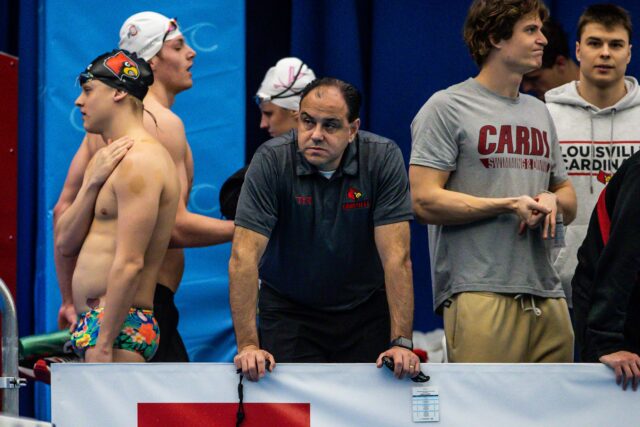By James Sutherland on SwimSwam
Louisville head coach Arthur Albiero was one of two power conference coaches of Olympic sports to testify during a House Judiciary Committee hearing last week on Capitol Hill, but the topic that has been on everyone’s mind in recent weeks was left off the table.
Albiero and Georgia head track and field coach Caryl Smith Gilbert expressed major concerns about the health and future of Olympic sports in the NCAA during the hearing, predominantly focusing on the argument against college athletes being recognized as employees.
However, Albiero and Smith Gilbert didn’t address the imposition of roster limits from the House settlement, which has caused a mass amount of swimmers to enter the transfer portal in the past few days and figures to hamper NCAA programs in Olympic sports in the coming years.
The House settlement will lift restrictions on scholarships and instead introduce roster limits, with Power Division I swim & dive teams set to have a cap of 30 spots beginning next season, save the SEC men which will only allow 22.
Albiero and Smith Gilbert’s argument was based on the idea that if college athletes became employees, there wouldn’t be enough money to go around to fund Olympic sports programs, incentivizing schools to cut them.
“While the proposed House settlement will provide a measure of structure to the NIL landscape, it also has consequences for athletic departments that do not generate enough revenue to cover the expenses for all of its sports,” Alberio said in his opening statement at the hearing.
“I have serious concerns about student-athletes potentially becoming classified as employees. This could create a number of undesirable and unintended consequences including taxation, changes in medical services, and the opportunities in general for non-revenue sports. The required financial administrative burden of treating student-athletes as employees could force institutions to make even more difficult decisions about how many sports institutions are able to offer.”
The coaches called on Congress to pass legislation to provide antitrust protections to the NCAA that would classify student-athletes as amateurs, adamant that it’s essential to keep Olympic sports afloat in college athletics.
“The NCAA, the conferences and its member schools need Congressional support,” Albiero said while testifying. “We all recognize that there are 30-40 schools that generate millions of dollars, almost exclusively from football and basketball and those athletes should receive a different level of support.
“However, not all football and basketball teams, even those at Division 1 schools, generate such large revenues. About 22% of NCAA athletes play football or basketball. Less than that play for a team that brings in more money than they expense. To lump all football and basketball programs into the same category as all the top Power 4 teams is not only senseless, but also harmful, yet that is what is happening.”
Notably, an open letter from the track & field community published on March 13 addressed the issue of roster limits, with Smith Gilbert listed as one of the 18 coaches who authored the letter. According to Front Office Sports, the letter went live on social media midway through the hearing.
You can listen to the full hearing below:
The NCAA has been publicly seeking antitrust protection that would prohibit student-athletes from being considered employees—if they were classified as employees, in addition to wages, schools would be on the hook to provide certain benefits afforded to all U.S. workers. If the NCAA is granted such protection, it could enforce restrictions on athlete compensation without facing legal challenges claiming the rules violate competition laws.
To gain that antitrust protection, the NCAA would need the House settlement to be approved. As noted by Front Office Sports‘ Amanda Christovich, it’s in the NCAA’s best interest to have their own witnesses, Albiero and Smith Gilbert, not bring up problematic consequences of the settlement like roster limits, but rather paint a picture of how “bleak” college sports would look if athletes were considered employees.
Also testifying in the hearing was Andrew Cooper, the Executive Director of the United States College Association, who was opposed to Albiero and Smith Gilbert’s push for antitrust protection and said the NCAA should be forced “to simply follow the same laws as every other business in our country.”
Cooper went on to say that Olympic sports “could easily be subsidized by university endowments or through state and federal funding.”
“We’re one of the only countries in the world that does not federally fund Olympic sport development.”
Read the full story on SwimSwam: Roster Limits Not Addressed As Arthur Albiero Testifies On House Settlement At Capitol Hill
Read More Details
Finally We wish PressBee provided you with enough information of ( Roster Limits Not Addressed As Arthur Albiero Testifies On House Settlement At Capitol Hill )
Also on site :
- Barcelona Clash with Villarreal: Preview, Probable Lineups & Where to Watch Free
- Inter Milan vs. Lazio - Match news and live streaming
- Where to watch Real Sociedad vs. Girona clash - prediction and lineups

